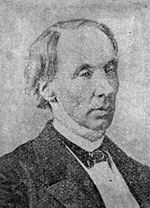Robert Dale Owen, Date of Birth, Place of Birth, Date of Death
TweetRobert Dale Owen
United States politician
 Date of Birth: 07-Nov-1801
Date of Birth: 07-Nov-1801
 Place of Birth: Glasgow, Scotland, United Kingdom
Place of Birth: Glasgow, Scotland, United Kingdom
Date of Death: 24-Jun-1877
Profession: politician, diplomat
Nationality: United States
Zodiac Sign: Scorpio 
About Robert Dale Owen
- Robert Dale Owen (November 7, 1801 – June 24, 1877) was a Scottish-born social reformer who immigrated to the United States in 1825, became a U.S.
- citizen, and was active in Indiana politics as member of the Democratic Party in the Indiana House of Representatives (1835–39 and 1851–53) and represented Indiana in the U.S.
- House of Representatives (1843–47).
- As a member of Congress, Owen successfully pushed through the bill that established Smithsonian Institution and served on the Institution's first Board of Regents.
- Owen also served as a delegate to the Indiana Constitutional Convention in 1850 and was appointed as U.S.
- chargé d'affaires (1853–58) to Naples. Owen was a knowledgeable exponent of the socialist doctrines of his father, Robert Owen, and managed the day-to-day operation of New Harmony, Indiana, the socialistic utopian community he helped establish with his father in 1825.
- Throughout his adult life, Robert Dale Owen wrote and published numerous pamphlets, speeches, books, and articles that described his personal and political views, including his belief in spiritualism.
- Owen co-edited the New-Harmony Gazette with Frances Wright in the late 1820s in Indiana and the Free Enquirer in the 1830s in New York City.
- Owen was an advocate of married women's property and divorce rights, secured inclusion of an article in the Indiana Constitution of 1851 that provided tax-supported funding for a uniform system of free public schools, and established the position of Indiana Superintendent of Public Instruction.
- Owen is also noted for a series of open letters he wrote in 1862 that favored the abolition of slavery and supported general emancipation, as well as a suggestion that the federal government should provide assistance to freedmen.
Read more at Wikipedia
See Also
- Famous People's Birthdays on 07 November, United Kingdom
- Famous People's Birthdays in November, United Kingdom
- Famous People's Birthdays on 07 November, United States
- Famous People's Birthdays in November, United States
- Famous politician's Birthdays on 07 November, United Kingdom
- Famous politician's Birthdays in November, United Kingdom
- Famous diplomat's Birthdays on 07 November, United Kingdom
- Famous diplomat's Birthdays in November, United Kingdom
- Famous politician's Birthdays on 07 November, United States
- Famous politician's Birthdays in November, United States
- Famous diplomat's Birthdays on 07 November, United States
- Famous diplomat's Birthdays in November, United States

